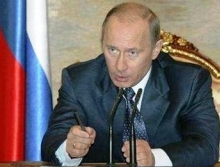 Vladimir Putin’s ruling party could see its vast parliamentary majority cut back in elections that began Sunday in the icy tundra and sparsely-populated swathes of Russia’s far east.
Vladimir Putin’s ruling party could see its vast parliamentary majority cut back in elections that began Sunday in the icy tundra and sparsely-populated swathes of Russia’s far east.
At polling stations from the Arctic to the shores of the Pacific Ocean, the election will indicate the scope of fatigue with Putin’s 12-year rule just three months before he asks voters to endorse his return to the Kremlin as president.
Russians interviewed by Reuters across the world’s biggest country gave a mixed picture. Some expressed disgust with a parliamentary election they said was likely to be rigged while others said they supported Putin and his United Russia party.
“I support United Russia. I like Putin. He is the strong leader we need in our country,” said Nikolai, a 33-year-old customs officer in Vladivostok, a port city of 600,000 people on the Pacific and the biggest city in Russia’s Far East.
Some voters said they would vote for Just Russia or the Communists because they were disillusioned with Putin and his party, a trend that could cost United Russia dearly.
Polls show Putin’s party is likely to win a majority but less than the 315 seats it currently has in the 450-seat lower house of parliament, known as the Duma.
If it gets less than two-thirds of seats, Putin’s party would be stripped of its so called constitutional majority which allows it to change the constitution and even approve the impeachment of the president.
Opposition parties say the election is unfair because the authorities support United Russia with cash and television air time while they say vote rigging will be employed to boost United Russia’s result.
Supporters say the former-KGB spy saved Russia during his 2000-08 presidency from the chaos of the immediate post-Soviet era and supplied the longest and steepest economic boom in a generation. He also crushed a rebellion in the southern region of Chechnya that tested the fabric of a federation spanning 9,000 Km (5,600 miles) from the Baltic to the Pacific.
Russian customs officers held the director of an independent election watchdog for 12 hours at a Moscow airport Saturday. The United States said it was concerned by “a pattern of harassment” against the watchdog.
PUTIN’S PARTY
Putin remains by far Russia’s most popular politician and the 59-year old leader is the ultimate arbiter between the clans which control the world’s biggest energy producer.
But his party has had to fight against opponents who have branded it as a collection “swindlers and thieves” and a growing sense of unease among voters at Putin’s grip on power.
“I shall not vote. I shall cross out all the parties on the list and write: ‘Down with the party of swindlers and thieves,’” said Nikolai Markovtsev, an independent deputy in the Vladivostok city legislature.
“These are not elections: this is sacrilege,” he said, adding that the biggest liberal opposition bloc had been barred from the vote by the authorities.
Opponents say Putin has crafted a brittle political system which excludes independent voices and that Russians are growing tired of Putin’s cultivated tough man image.
An outburst of boos and whistling at Putin by fans at a Moscow martial arts fight and a sharp fall in opinion poll ratings during the election campaign had raised concerns Putin may be losing his legendary political touch.
FAR EAST
Putin is almost certain to win the March 4 presidential election but signs of disenchantment are extremely worrying for the Kremlin’s political managers. Putin’s self-portrayal as the anchor of Russian stability hinges on his popularity.
In an attempt to reinvigorate his party, which President Dmitry Medvedev is leading into the election as part of a job swap announced in September, Putin has sent his closest allies to lead United Russia in some of Russia’s 83 regions.
Conquered by the Eastern Slavs under the tsars in the 18th and 19th centuries, Russia’s far east covers an area almost twice the size of India but has just 6.3 million inhabitants.
Russians in the region braved temperatures as low as minus 41 degrees Celsius (minus 42 Fahrenheit) to vote eight hours before polls opened in Moscow.
Chukchi reindeer herders living across the Bering Sea from Alaska began voting in late November as did some oil workers on rigs pumping the lifeblood of Russia’s $1.9 trillion economy.
Putin sent First Deputy Prime Minister Igor Shuvalov to his native Far East to lead the ruling party’s campaign in an area where one local journalist angered Medvedev during the campaign by appearing to imply the Far East was not even part of Russia. ($1 = 30.8947 Russian roubles)

Leave a Reply
You must be logged in to post a comment.